The Open Road as a Career
Imagine driving across the country’s highways, surrounded by beautiful scenery, and having the freedom to go wherever you want, whenever you want. This isn’t just a fantasy, it’s a reality for those with a Commercial Driver’s License (CDL).
Whether you’re looking to make a career change or have always wanted to hit the open road, you need to find out why getting a CDL can open up so many doors in this career.

In the world of transportation and logistics, there’s never been a higher demand for truck drivers. As goods are moving across the country, the trucking industry is a key part of the economy. But not just anyone can jump in the driver’s seat of a commercial truck and hit the open road. To become a professional truck driver, you need a Commercial Driver’s License (CDL). In this post, we’ll explore why a CDL is required for anyone looking to get into the trucking industry.
Meeting the Demand: Why Do You Need a CDL in Today’s Market
Booming Trucking Industry
The trucking industry is booming. With the rise of e-commerce and the need for goods to be transported, the demand for qualified truck drivers has never been higher. According to the American Trucking Association (ATA), the trucking industry moves over 70% of the nation’s freight by weight, it’s the lifeblood of the American economy. This growth will continue for years to come, and the demand for skilled drivers will only increase.
Top Trucking Companies
If you want to work for the top trucking companies in the industry, having a CDL is often a nonnegotiable. These companies value safety, professionalism, and expertise in their drivers, all of which are verified through attending truck driving school and getting the right certifications. The CDL skills test and training program proves the truck driver is qualified to work for the trucking company and won’t be a liability. Having a CDL opens doors to better job opportunities and gives you job security in an industry that will always need qualified professionals.

CDL Costs and Financial Benefits
CDL Costs
Getting a CDL does come with some upfront costs. These are fees for CDL training schools, written and practical exams, a commercial learner’s permit, and the actual CDL license. But when looked at as an investment in your future, these costs are pretty reasonable. Many community colleges and training schools offer affordable CDL training programs and some employers will even pay for training in exchange for a commitment to work for their company.
Financial Benefits
One of the biggest reasons to get a CDL is the financial rewards. CDL holders make more money than those without a CDL. According to the Bureau of Labor Statistics, the median annual wage for heavy and tractor-trailer truck drivers is above the national average for all occupations. With experience and specialized endorsements (hazmat or tanker), you can make even more.

CDL School
When choosing a CDL school look at the curriculum they offer. Make sure they cover all the essential parts of CDL training, both theoretical and practical. A well-rounded curriculum will prepare you for the written and skills tests to get your CDL.
Consider the cost of CDL training which can vary greatly from school to school. While budget is important, remember quality training is an investment in your future. Some schools may offer financial assistance, scholarships, or even employer-sponsored training programs to help with the cost.
Look into the graduation rate of the CDL school you’re considering. Find out how many of their students get their CDL and get hired in the trucking industry. A high graduation rate is a good indicator of the school’s quality of training and ability to prepare students for a career.
Some trucking companies offer their own CDL training program. These programs often come with a job offer upon completion. While this can be a great option, make sure to weigh the pros and cons, like any employment commitment you may have to make in exchange for the training.
CDL License Options
Now let’s get into the fun stuff.
Long Haul Trucking
Long haul trucking lets you travel the country, delivering goods over long distances. This option gives you adventure and the opportunity to see different parts of the country while getting paid.
Local Deliveries
If you want to stay close to home, local delivery routes are a great option. You can work for local distribution companies, supermarkets, or courier services and get products to their destinations in your community.
Specialized Transport
CDL holders can get specialized endorsements like hazmat or tanker endorsements which open up opportunities in niche areas like chemical transportation, fuel delivery, and more.
Construction and Public Transit
CDL is also required to operate heavy equipment and commercial vehicles in the construction and public transit industries, which opens up more job opportunities beyond traditional trucking.
Connecting with Trucking Companies After Certification
Once you get your CDL license your next step is to connect with potential employers in the commercial truck driver industry. This is crucial to get started and can make a big difference. Here’s how:
Start by researching trucking companies that match your career goals and location preferences. Whether you want long-haul trucking, local deliveries, or specialized transport, finding the right employers is key. You can connect by attending industry events and using online job boards like TruckingTruth and Indeed which offer valuable information and networking opportunities.
To stand out from other applicants, create a great resume that highlights your CDL, endorsements, safety record, and any experience you may have. Remember employers are not just looking for CDL holders, they are looking for professionals who prioritize safety and reliability in their work. Make sure your resume shows your commitment to following regulations and safety protocols.
Also be prepared for a driving record, background check, and drug test as part of the hiring process. Showing your commitment to following regulations and safety protocols will make you a top candidate.
CDL License – Your Key to a Great Career
In the fast-paced world of transportation and logistics having a Commercial Driver’s License (CDL) is not just a piece of paper; it’s your ticket to a secure and lucrative career. The trucking industry is booming and will always need qualified professionals to move goods across the country. By getting your CDL you’ll have job security in an industry that’s essential to our economy. 70% of the nation’s freight is moved by trucks so the demand for skilled drivers is always increasing and provides a level of job stability that few other careers can match.



